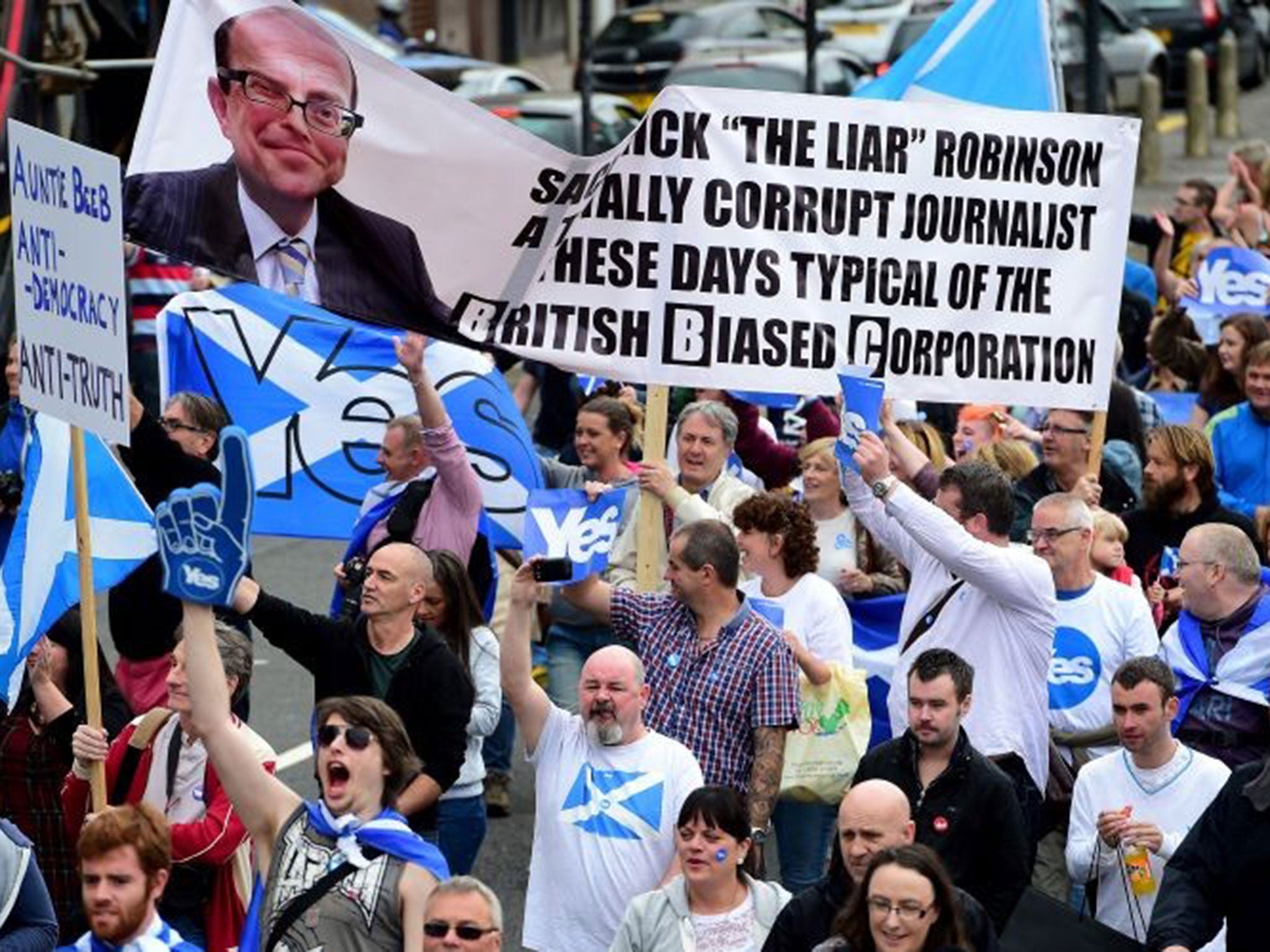Scottish Independence: It’s a Yes for the way the referendum was reported
The Media Column: Slurs of partiality are unjustified

Amid recriminations among Yes supporters following the result of the Scottish referendum, there was a palpable sense that the media had played an ignoble role in a process that was otherwise widely lauded as a triumph for democracy.
Bias, undiluted propaganda and outright lies from broadcasters and newspapers denied the separatists their destiny, the narrative went, as the Scottish news machine was operated by shadowy figures pulling levers south of the border.
Only one Scottish newspaper – the Sunday Herald – had the courage to back independence and as for the British Broadcasting Corporation, well, the clue was in the name.
The romantic figures in this story were the young Yes-supporting websites and bloggers – such as Bella Caledonia, Newsnet Scotland and Wings over Scotland – which had seized the moment and made their mark on a national stage.
In the anti-climax of defeat, the frustrations are understandable. And the anger expressed online towards traditional media by elements of a movement backed by 45 per cent of Scottish voters means that news organisations, especially the BBC, face a great challenge in winning back trust.
So high were the stakes that newspapers will have lost some readers forever. On the upside, an exercise that drew 85 per cent of the electorate to the ballot boxes may encourage a wave of young Scottish news junkies, counter to trends elsewhere.
Either way, slurs of partiality directed at the hundreds of journalists who have dedicated themselves to covering one of the great stories of their lifetimes are unjustified.
Those who, like Professor Raymond Boyle of the University of Glasgow, have devoured vast amounts of Scottish newsprint during the three-year process are mystified by the crude accusations of bias. Although both The Scotsman and The Herald declared in editorial essays their backing for the Union, both had “richness and diversity” in their comment pages with writers such as Iain Macwhirter (Herald) and Joyce McMillan (Scotsman) arguing for independence, he said. “The idea that they took an editorial line and were squeezing out anything that didn’t fit in does them both a disservice.”
As for the tabloids, both the Scottish Sun and the Daily Record refrained from telling readers how to vote, despite the former’s owner, Rupert Murdoch, furiously tweeting enthusiasm for the Yes campaign. For Mr Murdoch, it’s always a numbers game, and a 55 to 45 margin showed he was right to stay on the fence, even if he would have enjoyed seeing David Cameron humiliated by the break-up of the Union.
Professor Boyle, who is based in the university’s Centre for Cultural Policy Research, is similarly bemused at distinctions between the output of BBC Scotland (subjected to aggressive protests and bias accusations by the Yes campaign) and STV. The commercial network, which broadcasts from a building close to the BBC in Glasgow’s Pacific Quay, was not targeted. “My own sense was that the coverage was pretty similar,” he said.
Both Sarah Smith, presenter of BBC Scotland’s key current affairs show Scotland 2014, and Bernard Ponsonby, commentator on STV’s rival Scotland Tonight, did their jobs admirably, according to Eamonn O’Neill, an investigative journalist and academic at the University of Strathclyde.
O’Neill believes the BBC – and newspaper websites – missed a trick by not embracing a more open stance, inclusive of their critics. He said the BBC took an “analogue approach” to its coverage and applied general election treatment to what was “a unique electoral event”. He might be right. Certainly, sites such as Bella Caledonia and Wings over Scotland (written by the Rev Stuart Campbell and backed by £200,000, mostly raised from crowd-funding) found an audience. There is no reason why they will not become lasting fixtures of Scottish media.
BBC political editor Nick Robinson’s unfortunate editing of an exchange he had with First Minister Alex Salmond shortly before polling day became the social media-propelled Exhibit A in the Yes narrative of BBC bias. I think calls for Robinson’s dismissal were a hysterical overreaction. But his presence in Scotland – along with other “bigfooting” stars from down south, such as Huw Edwards and Jeremy Vine – encapsulated a wider BBC problem.
If the BBC was unaligned with the UK Government, it did share a similar image problem in the eyes of a large section of the public north of the border: it would not trust Scots to do the job themselves. Trusted Scottish voices, such as BBC Scotland political editor Brian Taylor, sometimes appeared marginalised. At least BBC Radio’s bigfoot, James Naughtie, is both a vastly experienced journalist who covered the story with aplomb – and a Scot.
But if the BBC – which was obliged to cover the story for the whole UK – had not sent in its big-hitters from London, it could have been accused of failing to give the story the weight it merited.
It will be a time of introspection for BBC Scotland, which must have pondered taking down its signage in Glasgow. But I doubt all 1.6 million Yes voters will hold a lasting grudge. Twitter is a powerful campaigning tool – as this vote showed – but it does not reflect the views of entire nations. Now, as the dust settles, Scotland can reflect on giving the world a lesson in democracy in action, with a robust debate producing a remarkable turnout. Its media deserves a share of the credit for that.
Join our commenting forum
Join thought-provoking conversations, follow other Independent readers and see their replies
Comments